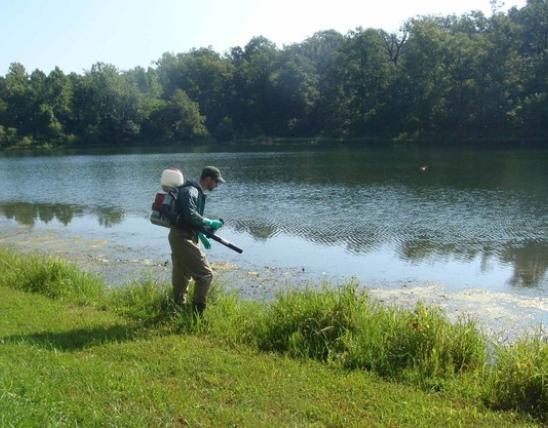In a stand of flooded hardwood timber, on opening day of duck season, a hunter waits. At his side, sitting on a portable tree stand lashed to a pin oak, a chocolate Lab scans a pewter sky. Suddenly, the dog perks his ears and sits erect. The hunter reads this signal and spies a lone drake wood duck, wings cupped, sailing between the trees.
With the woody at 30 yards and closing, the hunter shoots and the duck tumbles. The Lab leans forward, his attention locked on the downed duck.
"Back!" the hunter commands, and the Lab leaps into the water. With chin flat against the surface, the retriever swims hard to the bird. As he picks up the duck and turns back to the hunter, a half dozen green-winged teal buzz past, just over the treetops. The hunter drops one. The Lab pauses to mark where the teal fell, then quickly returns the wood duck to his master.
The hunter grabs the Lab by the back of its collar and pulls the dripping dog back up on the tree stand. He gives the dog a congratulatory pat on its shoulders, takes the bird and praises the dog.
Taking little notice, the Lab sits and leans forward in anticipation of retrieving the teal.
"You like your job, don't you?" the hunter asks with a smile, and then barks the command, "Back!" The Lab hits the water with a splash and cuts a wake to the second bird.
This is work from a well-trained gun dog--both exciting and practical. For many hunters, a gun dog is an important and enduring investment; one that should not be made lightly. If you have been thinking about buying a gun dog, here are a few things to consider.
Your Disposition
The first question you should ask is not whether a dog is right for you, but whether you are right for a dog. Are you patient, or do you have a short temper? Are you disciplined concerning routines, or do you tend to quit when routines grow old? Do you accept responsibility for your mistakes, or are you prone to place blame elsewhere? Honest answers to these questions will reveal whether owning a gun dog is right for you.
Gun dogs achieve their greatest performance through effective training programs carried out by patient handlers. Patience is central to the training process. When a lesson is new, dogs may have trouble understanding what response an owner wants. Even trained dogs will try to disobey commands. No matter how frustrated you get at such times, it's crucial to be patient and thoughtful in correcting them. Impatience, leading to anger, is counterproductive to dog training.
It's important to realize that routines are a primary part of owning a well-trained gun dog. Dogs learn through consistent repetition. Some people enjoy routines; others quickly grow bored with them. If you don't like routines, then owning a gun dog could prove frustrating.
When a dog makes a mistake, most of the time it's the owner's fault. Dog mistakes reflect mistakes in training and handling. If you tend to blame the dog instead of yourself, you probably aren't ever going to own a great hunting dog.
Prospecting
If you have the personal qualities necessary to own and train a gun dog, then the next step is finding the right dog. Research hunting dog breeds to find the one with the traits and qualities you desire, but don't buy on breed alone. Many dogs simply don't have the inherent ability to develop into skilled hunters. Some possess hunting characteristics that don't match sportsmen's needs. For example, some dogs are known for hunting close and methodically, while others are known for ranging far and charging hard. You need experience and knowledge to pick a good dog
On a quail hunt, for example, the close-hunting performance of your friend's Brittany spaniel might impress you to the point that you decide you want just such a dog. Many hunters might look in the newspaper, find someone selling Brittany pups, visit the owner, take a fancy to one of the pups and take it home the same day. As likely as not, the dog's hunting abilities will be disappointing.
All Brittany spaniels do not hunt close. Some are bred to compete in field trials. These dogs range far in quest of game. The Brittany might even have come from show stock parents with little hunting instinct. Such a Brit may look nice, but it might not hunt a lick.
Only buy a pup out of parents that are skilled hunters. If both parents are skilled hunters, chances are their pups will have what it takes to develop into good gun dogs. Genetics determine a pup's potential.
If both are available, ask to see the parents work in the field. If only the mother is available, which is often the case, she may be worn down from the rigors of feeding and caring for her litter and not up for a good showing. If so, and if she has had other litters, ask for the names of people who own pups from one of her previous litters. The success of these pups, if sired by the same dog, will reflect the current litter's potential.
Ask about the parents' temperament, intelligence and hunting desire. How easy were they to train? How far do the parents range when hunting? Are they naturally softmouthed when handling game? Are the hips of both parents OFA (Orthopedic Foundation for Animals) certified? Many gun dogs, especially larger breeds, suffer from hip dysplasia, a crippling disorder. Don't be afraid to ask questions. Pups from quality parents often run $500 or more. For that price, you should get quality.
Take the pup home when it's seven to eight weeks old. Taking the pup home sooner will prevent the pup from developing proper canine social skills. Taking the pup home later will increase the likelihood that the pup will have developed a submissive or a dominant position in the litter. Both personality types are undesirable. A submissive pup will have difficulty handling the pressure of training. A dominant pup will often be rebellious and stubborn.
Also never buy a pup that has spent months on end in the kennel with minimal human contact and no opportunity to explore new surroundings. Pups raised under these conditions are almost always nervous. They are tentative and often scared of any new situation. Seldom do they develop into good gun dogs.
You can forego these potential problems by buying a mature gun dog that is already trained. All you have to do is reach deep into your billfold. Prices for trained dogs start at about $1,500 and go much higher, depending on a dog's pedigree and level of training.
Training
Transforming a quality pup into a dependable hunting dog requires months of training. If you haven't the time nor inclination to do it yourself, you can hire a trainer to do it for you. Fees for training a gun dog range up to $800 a month. A skilled trainer, working a dog of normal ability, may turn out a pup, ready to hunt, in four to eight months.
If your pup begins training at three to four months old, it may be a competent hunting companion by its first birthday. Even after a careful training program, most gun dogs don't really blossom until they have two or three hunting seasons behind them, and only then if they've spent a lot of time hunting.
Though training a gun dog takes time, the time it takes each day to train is actually very little. Fifteen to 20 minutes a day represents a solid training session for an adult dog. Puppies have shorter attention spans. A good training session for a pup may be five minutes or less. The key is being consistent with commands and pursuing an effective training plan.
Regardless of its training, every dog will try its owner. If allowed to disobey a command, a trained gun dog will quickly "forget" what it has been conditioned to do. A gun dog owner must know how to enforce commands. Every hunting trip is a training session in which a dog must respond to a learned command. If the dog responds incorrectly, the dog must be corrected. Disobedience, if allowed, will ruin a trained dog in short order.
Keeping a dog sharp requires year-round training. Many trainers keep live birds with which to train their dogs. Gun dog enthusiasts don't consider the extra work an inconvenience. For them, watching a well-trained gun dog work is as much a part of the hunt as the whistling wings of waterfowl and the cackling flush of a pheasant.
Learning More
Gaining specific knowledge concerning gun dog training involves reading and research. A number of excellent books are available. Best Way to Train Your Gun Dog: The Delmar Smith Method, by the late Bill Tarrant, is an excellent general reference on training gun dogs, as is Gun Dog, by Richard Wolters. Tarrant wrote two books for learning how to train retrievers. Hey Pup, Fetch It Up! The Complete Retriever Training Book and Training the Versatile Retriever to Hunt Upland Birds are both excellent sources of information.
The Internet is a great source for gun dog training and handling tips. Type in "training gun dogs," hit "search" and you'll find thousands of howto listings.You will also find listings of pro trainers who will e-mail answers to your questions. It's exciting to get direct responses from some of the world's top breeders and handlers of gun dogs. Type in "literature training gun dogs" for complete listings of books and periodicals.


And More...
This Issue's Staff
Managing Editor - Bryan Hendricks
Art Director - Ara Clark
Artist - Dave Besenger
Artist - Mark Raithel
Photographer - Jim Rathert
Photographer - Cliff White
Staff Writer - Jim Low
Staff Writer - Joan McKee
Circulation - Laura Scheuler






















